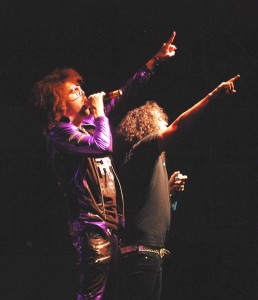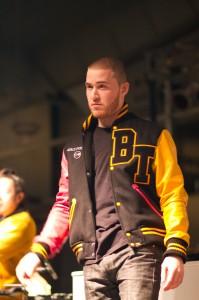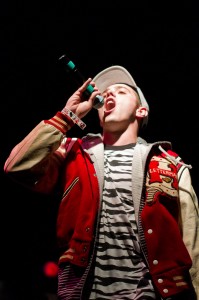LMFAO, Mike Posner and Sam Adams — the performers at the College Union Board's Spring Fest 2011 — sat down for interviews at the March 29 concert with Signal features editor Jamie Primeau. The full story about the show can be found here.
--
Shiny purple pants and a “Hi Mom” shirt were the clothing choices of LMFAO’s Redfoo and Sky Blu, respectively. The two chatted with The Signal before shaking up the stage, as they closed the show with an eruption of color, confetti and condoms – and splashes of sparkling cider.

The Signal: Some of your songs have made their way to becoming the theme song for TV shows, for example the "Jersey Shore" theme and the theme song for one of the Kardashian Shows. If you had the opportunity to make the theme song for any television show what would you pick?
LMFAO on their ideal theme songs
Sky Blu: "Home Improvement."
Signal: Can you sing what that would sound like?
SB: It would be a dubstep version. (sounds)
Signal: And what about you?
Redfoo: I’d do that classic show "The Cosby Show," and it’d sound like this. (sounds)
It would be the UK Version. It’s Bill Cosby in the UK. ‘Just want to put my pop in your pudding.’ That would be the British version.
Signal: Okay, so since you sing the theme song for “Jersey Shore,” do you actually watch the show, and what are your thoughts on it?
LMFAO's speaks about Jersey Shore
SB: Amazing show, amazing cast of individuals.
Signal: Are you being serious?
SB: Yeah, they’re amazing. Always just being themselves.
RF: I remember when I saw the first episode ever, and Snooki had a real attitude, and she just didn’t give a fuck. They were like, ‘You’re gonna be working. You’re gonna be doing this.’ And she was like, ‘Look, I don’t work.’ It was crazy. I knew it was gonna be a dynamic show.
And also too it’s funny that you say that because it’s actually MTV’s biggest show, and they need to put our video on MTV (for "Party Rock Anthem") … They have not yet played it. But we are saying, ‘Why, why, why won’t you play it?’ It got six million views on VEVO in about a week and a half. Because we think it’s best video of the year, so they have to play it so we can be nominated to host the MTV (music) video awards.
Signal: Is that your goal, to host MTV’s (music) video awards?
RF: Yeah, the next time. So if you could put a little thing in there (the article) and send it their way …
Signal: Since apparently the name LMFAO came from an AIM conversation with (Sky Blu’s) grandmother, what is your favorite or most used acronym?
Acronyms with LMFAO
RF: Oh, I like DTF.
SB: ATM, because I like to get my money.
RF: DTF, down to Facebook.
--
Prior to his performance at the College’s Spring Fest, Mike Posner spoke with The Signal inside his tour bus. The Duke University alumnus shared why completing his education was important to him, what he’s up to now and how to make it in the music business. Also, he classified our campus as “really pretty.”

The Signal: Since you attended Duke and graduated last year, were you rooting for them to win March Madness until they lost to Arizona?
Posner discusses Duke's time in the tournament
Mike Posner: Of course. I still have a lot of friends on the team. Nolan Smith I talk to all the time, so I was bummed out that they didn’t get as far as last year. But I’m sure they’ll be back soon.
Signal: Okay, so then my more serious question is –
MP: I’m scared now.
Signal: No, it’s not too serious. According to my research, you still returned to school after signing a record deal and recording songs, and you graduated with a good GPA and were involved in a fraternity. How did you do this, and why was it important to finish your education before fully delving into music?
Posner's speaks about balancing his education and musical aspirations
MP: Most people in the world don’t get the opportunity to go to college at all – let alone a college like Duke, so it was important for me and my family for me to finish and get my degree. And to have them be proud of me.
Signal: Was it difficult to do that?
MP: Definitely, without a doubt … While my academics were important to me, I still had a fledging career that was probably a little bit more important to me, and so I found myself juggling the two. I’d go to class during the week, and every Thursday I’d fly out of the Raleigh airport.
Signal: And what did you major in when you were at school?
MP: I majored in sociology.
Signal: Do you still plan on pursuing anything with sociology?
MP: Not at the moment, but who knows what the future holds.
Signal: Was music always your main plan while going to school?
MP: Yeah, I was always making beats in my dorm room.
Signal: What advice would you offer to those interested in music and other students who consider just dropping out school to pursue music?
MP: I would say make really original music. Don’t try to be like anybody else … Work harder than everyone else.
Signal: A year ago when you were at school did you see yourself winding up where you are now – collaborating with Lil’ Wayne on a song and having top songs?
Posner reflects on his success
MP: These were all goals of mine. I didn’t think that they would become realities as quickly as they did. You know, like it’s crazy for me to think that a year ago I didn’t have my degree.
Signal: So then what’s up next for you, are you recording another album or are you touring?
MP: This is the first day of my Spring Tour. And I’m like halfway through my next album.
--
After finishing his set on the Recreation Center Stage, Sam Adams sat down for an interview with The Signal in his dressing room. He had performed his hit songs, “I Hate College” and “Drivin’ Me Crazy,” along with a lot of dubstep. The 22-year-old introduced himself with a handshake as “Sammy,” as he sipped on a bottled beer.
The Signal: Are you by any chance drinking Samuel Adams beer, like your name?
Sam Adams: No, I like Coor’s Light. I like cheap, shitty beer.
Signal: So, what did you think of the show? How did it go?
Sam's reaction to the show

SA: I thought it was great … It’s the coolest feeling in the world getting to perform. It’s just like the best feeling … It’s really interesting to see how the crowd reacts to different songs, so we sort of build our set while we go, unlike most people that have like a routine or a set, and the band knows when to transition. We sort of just ad-lib that ‘cause we just like to have fun. But it was awesome. Everyone looked really stoked.
Signal: Did you know that actually last year Asher Roth came here to perform, so it’s kind of like a full circle because he did "I Love College"?
SA: I did not. That’s awesome. Yeah, he’s great. He’s a friend so that’s really cool.
Signal: So my question is, do you really hate college, and did you have an unpleasant college experience?
Sam Adams discusses his song "I Hate College"
SA: No, I loved it. It was more just defining my hate for my teachers and being in class. It was crazy because it all sort of started to happen when I was still in class, and it was really fucking annoying to go to class and listen to the teacher. It’s like, ‘I’m not going to use anything you’re saying in real life because I already have something going on.’ So it just sort of stems from that. I actually wrote it in class, both verses.
Signal: Really? What class were you in?
SA: I was in a political science class. It was like European politics or something. It was awful. He was just a bad teacher. So I would just write, and I wrote like six verses and picked my favorite two, and that’s how I made ‘I Hate College.’ But I don’t hate it, I loved it. I had a blast. I wish I could go back.
Signal: Last year around this time the sales of your first singles surprised critics, and they accused you of buying all your own songs, so I was wondering, how did you manage to have a top selling song, and how did you use social networking sites to get your name out there?
SA: It’s sort of amazing. When I started high school I was always just really nice to everyone. Our whole motto is just to show love … So all the people I met throughout high school and all the people I met throughout college – I went to four high schools, I went to two colleges, so I met a lot of people – I just kept really good relationships, and by doing that, just off word of mouth, people listened to our shit ... We were just going around to different schools doing little frat events ... It wasn’t for a bill or money or anything. It was just for the fact that we loved doing it. It’s a blast to see all these kids migrate toward one place and be like – “Oh he’s coming to play.” It’s like holy shit, ‘cause as a little kid, I was always so fascinated by performing and how many people would come out to see people play. So I was super passionate about it. We really just built it on our own and all the social media networks helped out so much. Like YouTube, Facebook, we didn’t use Twitter as much.
Sam Adams speaks about how social-networking sites helped build his career
It’s really crazy what those sites can do. You really sort of just gotta believe in yourself, find kids that’ll listen to your music. Our music’s all positive. There’s a lot of critics and hip-hop people who are like, ‘He’s not hip hop. He’s not rap.’ It’s like, good don’t put me in that fucking genre anyway. I’m a good time music. All those networks, everything really helped us out. Word of mouth the most, so we owe our fans so much.
Signal: Mhm. Because I know technology is changing so many aspects of media, like how people can just download songs illegally, do you think technology is affecting the music industry in a positive way or a negative way?
Sam Adams discusses the influence of technology on the music industry
SA: I think coming from a record exec’s standpoint, totally negative ‘cause it’s like you’re not selling records. But it’s such a double-edged sword. Having YouTube you can get your songs out for free. But then there’s a piracy issue ... People have such a skewed vision of like, ‘Oh, I got to number 10 in two days, or I’m at number one.’ Cool, you sell 70,000 records as an independent, but you rarely see any of that money because of all the money you put into produce the records. You get money through touring.
So it’s a very unbalanced answer to the question, ‘cause there’s a lot of positive things about it, and obviously coming from the record labels, piracy’s always been an issue. But for touring and really getting your music out, for artists that love their fans, it’s like it’s not that big of a deal. If it is, it’s like – maybe you should find a new job.






